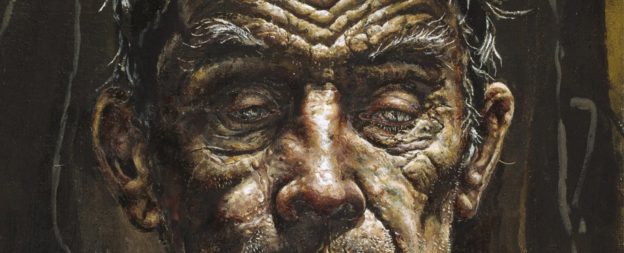In “No Country for Old Age,” The Hedgehog Review’s Joseph E. Davis writes, in essence, of the cruel biological reductionism and medicalization of old age, a natural stage of life that ought to be valued:
“When it comes to old age, illness, and death, little remains to us of common meaning or shared social rituals.”
Here are some of many profundities excerpted:
… In our society, to come directly to my point, old age is understood and framed in ways that lead inevitably to its devaluation. Its status is low and arguably is falling.
… old age [is seen as having] no value in itself. ‘Old’ signifies bodily decline, while “success” involves a ceaseless battle to defeat degeneration, and hope is always invested in the prospect of overcoming limits through self-reliance and technological interventions.There is no space here for stillness or release, no sense of value or consolation in the evening of life. Even cultivating spirituality is framed instrumentally in terms of promoting ‘better physical and mental health in old age.’ An imperative to defeat aging and even death can only consign these realities to fear, shame, and avoidance.
…Representations of old age that add censure and shame to greater dependence and loss of one’s powers can only make matters worse.
… the sociologist Norbert Elias argues that, over time, these weakened bonds and other common features of the later years have been compounded by increased individualization and the isolation of the “ageing and dying from the community of the living.” In contemporary society, Elias argues, older people are “pushed more and more behind the scenes of social life,” a process that intensifies their devaluation, emotional seclusion, and loss of social significance. A physical and institutional sequestering and a pervasive cultural tendency to “conceal the irrevocable finitude of human existence” have made it harder for them and those around them to relate to, understand, and interact with one another. The aged and dying are less likely to receive the help and affection they need, and more prone to different forms of loneliness and painful feelings of irrelevance. “Never before,” Elias writes, “have people died as noiselessly and hygienically as today in [more developed] societies, and never in social conditions so much fostering solitude.”
… Health and longevity are the ends to which remedial action is directed and by which outcomes are evaluated. Even in discussions that include exhortations to build strong connections and communities, loneliness and isolation are treated as individual conditions, and references to community easily coexist with talk of genetic hardwiring, the role of the prefrontal cortex, and the ways in which neural mechanisms might generate feelings of loneliness.
… Typical advice is often some form of self-help: “take a class,” “get a dog,” “volunteer”; build your confidence with social skills training; seek out behavioral therapy. With therapy—highlighted for its positive “impact”—the aged lonely can be helped to see that their low self-worth, perceived isolation, or feelings of being unwanted are probably just cognitive misapprehensions that need to be “restructured.” Once this restructuring is accomplished, the aged can better match what they want in social life with what they have and get on with aging with more success. The status quo can now appear in a new, more uplifting light.
… Current constructions of old age in individualistic terms of self-reliance, the fit body, productive accomplishments, or an imperative to deny or defeat aging technologically cannot but deepen our predicament and the need to render it invisible. This is what makes the cultural logic of these constructions irredeemable. They leave us in a cul-de-sac, hemmed in by a predatory commercial culture, a punishing ideology of health, fewer and weaker social ties, an ethic of active striving and mastery, and a mechanistic picture of ourselves. Moving beyond the devaluation of old age requires other orientations and other practices for which we must look elsewhere—to other societies, past or present, and to older traditions. …
… The social orientation of the evening of life need not be individualistic, but toward family and the localization and strengthening of social relations. Similarly, the view of the life cycle need not take its bearings from youth and middle age but from roles and identities appropriate to old age, with their own norms and rewards. These norms and rewards need not be defined in terms of active striving and productivity, but in terms of release, such as from social climbing, and a more contemplative attitude toward the world.
“No Country for Old Age,” by Joseph E. Davis, The Hedgehog Review.
UPDATE (2/22/021): And the good about aging in America.
When "This free time" [of older age and retirement] "is most commonly used not for cultivating interests but for self-hypnotizing in front of the screens that fill the lion’s share of one’s time…' Yuk. In America, we stay alive, even as we age. https://t.co/S3s5usaDgx
— ILANA Mercer (@IlanaMercer) February 23, 2021



 print
print